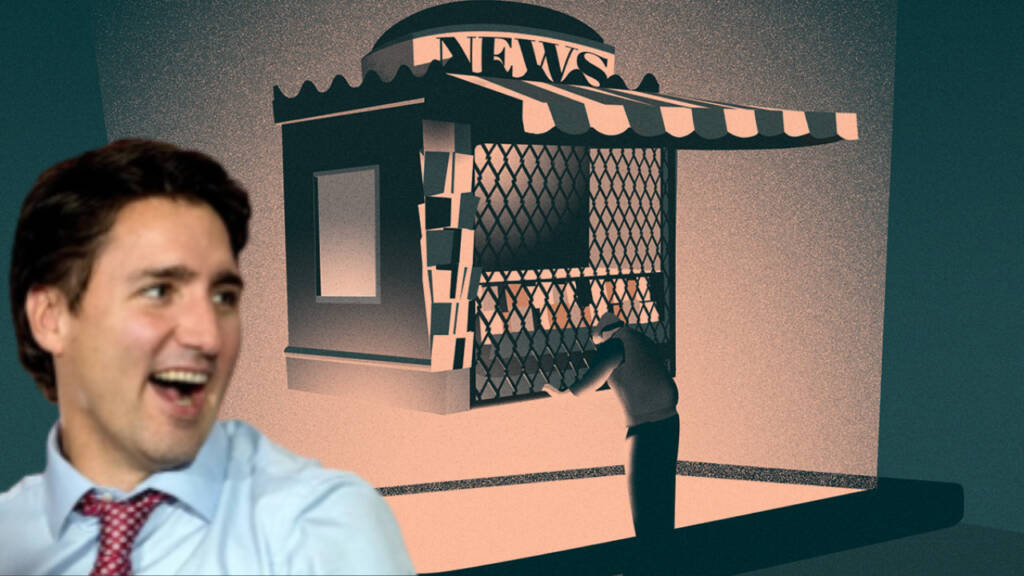In recent news, the Canadian government, led by Prime Minister Justin Trudeau, has made a move that’s raising eyebrows and stirring debate. They’ve decided to boost the Canadian Journalism Tax Credit, a decision that’s got both supporters and critics talking.
First things first, let’s break down what this tax credit is all about. It’s a refundable tax credit that helps news outlets with some financial relief. Qualifying organizations can claim up to 35% of up to $85,000 in salary for each eligible journalist. This is a jump from the previous 25% of up to $55,000 which was already way too high. Initially introduced in 2018 and rolled out in 2019, it was a move to support print news publishers who were struggling financially or in other words to advertise Trudeau.
Now, with the recent update, the credit’s been expanded and will apply retroactively from the start of 2023. This expansion isn’t small change; it’s projected to cost the federal government around $129 million over five years.
But here’s the catch – not every news outlet can just apply and get the benefits. To be eligible, an organization must be a “qualified Canadian journalism organization.” This means they need to focus on producing original news content, primarily covering matters of general interest, current events, and democratic institutions and processes AND be liked by the Trudeau Administration. Plus, the employees who are covered under this credit need to spend most of their time in news gathering, reporting, writing, or researching, working at least 26 hours per week.
Read More: Tech Giants Win Big in the Trudeau Face-off
Expanding on the concerns surrounding the Canadian Journalism Tax Credit, it’s worth delving into the criteria for what constitutes a “qualified Canadian journalism organization.” This definition, as it stands, seems broad and open to interpretation, which raises significant issues about potential government overreach and bias.
Firstly, the fear that right-wing and centrist news outlets WILL be systematically excluded from this tax credit is a serious concern. If the government, particularly one led by a center-left party like Trudeau’s Liberals, were to use this vague definition to favor organizations that align with their ideological stance, it would represent a stark politicization of media support. This could effectively silence or marginalize dissenting or alternative political voices, undermining the diversity of opinions in the Canadian media landscape.
Join us on Telegram: https://t.me/tfiglobal
Moreover, the situation becomes even more troubling when considering independent media like blogs and YouTube channels. These platforms have become vital for a range of voices, offering perspectives often not covered by mainstream media. However, under the current criteria, it’s feared that these independent media sources might find themselves categorically excluded from receiving financial support. This exclusion could stifle innovation and diversity in journalism, favoring traditional media outlets and potentially leading to a homogenization of news and views.
The situation becomes more complex when looking at international bloggers who comment on Canadian politics. The fear that these individuals could be outright crushed or penalized for not being Canadian is alarming. It hints at a kind of informational protectionism, where only Canadian voices are deemed valid in discussing Canadian issues. This approach not only silences global perspectives but also undermines the universal values of freedom of expression and the global exchange of ideas.
This is akin to “Big Brother’s Ministry of Truth” from George Orwell’s dystopian novel “1984,” these developments could be seen as a step towards a form of state control over media. The Ministry of Truth, in the novel, is responsible for propaganda and historical revisionism, aligning history and news with the party’s agenda. While the Canadian situation may not be as extreme, the comparison is drawn to emphasize the potential for government interference and manipulation of media under the guise of support.
This situation presents a stark warning: when the government starts to define what constitutes legitimate journalism and who qualifies for support, it treads on a dangerous path. The risk of political bias, suppression of diverse voices, and the undermining of journalistic independence looms large. It’s a scenario where government support could paradoxically lead to a less free and less diverse media landscape, contradicting the very principles of free speech and independent journalism that are fundamental to a healthy democracy.
Read More: Trudeau is preparing to clip the wings of Media. All Media. Even Liberal Media
The response has been thrilling as far as liberal news media is concerned. Andrew MacLeod, the big boss at Postmedia Network, Canada’s largest newspaper publisher, is obviously thrilled. He sees it as the government recognizing the crisis in the industry and offering meaningful support. But he’s also calling for more structural reforms, not just financial bandaids.
Critics are raising their eyebrows, suspecting that this move is less about supporting journalism and more about buying positive press for Trudeau’s government. They argue that by controlling who gets the credit, the government can indirectly influence what kind of news gets reported. This means that only those who paint the government in a good light or support their policies might end up benefiting from this scheme. It’s a slippery slope when the government starts having a say in who gets financial support in the media world.
As Canadians watch these developments unfold, they’ll have to decide for themselves if this is a genuine effort to support an ailing industry or a cunning move to sway public opinion.
Watch More:
https://youtu.be/mj0xML6LDkY?si=u9kSdnjvlp_3p30s
